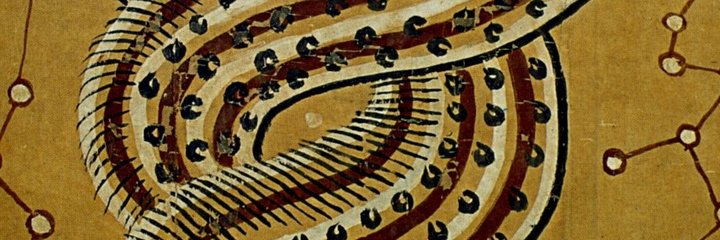
Unbegun
道沖而用之 Laozi's way empties and exhausts us. 或不盈 It's not something that empowers us.
淵兮 似萬物之宗 Like a vortex, generations of living creatures. 挫其銳 解其紛 和其光 同其塵 It dulls our sharp edges, loosens tight knots, dims bright lights, settles thick clouds of dust. 湛兮 似或存 Like an instinct, something that helps it survive.
吾不知誰之子 象帝之先 Child of who knows what, eldest of the elder gods.
Notes
The title is 無源 from Heshanggong.
Every English translation I've seen describes 道 as empty (沖) and 用 is our use of it. Here, 沖, 用 and 盈 are verbs, the object of each is 萬物, and all three complement the 其 sayings as 道's entropic balancing, moderating effect.
Given 宗, 存, 子 and 先, another theme of the poem is something like evolution.
In Heshanggong, the 其 sayings are advice. Sharp edges (銳) are the desire for worldly success, fame and fortune, which should be discouraged. Tangled knots (紛) are grudges, which should be resolved by meditating on 道's unbiased, hands-off approach (無為). Bright lights (光) are true believers who should learn to keep their lamp under a bushel, or at the very least not threaten people with violence. Finally, 同 is fellowship. It's about living in the real world with everyone else, not keeping yourself separate and aloof.
I've been more or less literal with the 其 sayings except that 同 is more like equalize (as 和 is more like harmonize) and 塵 is a cloud of dust or maybe a strong, lingering odor.
As if 湛 is saturated or soaked and 存 is keep safe, preserve.
In pre-Qin and Han ctext, 象帝 appears once in Laozi and once in Guoyu, and in Guoyu, it refers specifically to ancient sage-king Shun (舜). In Laozi I think it refers collectively to mythic gods and heroes of the distant past.